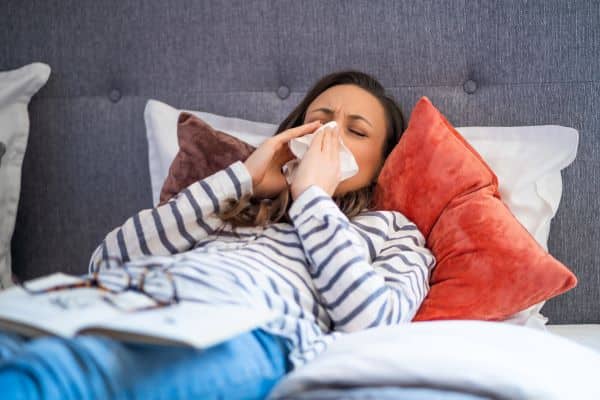As winter blankets the world in its chilly embrace, it brings with it a flurry of health myths that have been passed down through generations. These myths, ranging from the innocuous to the potentially harmful, often lead to misconceptions about how to stay healthy during the colder months. This article aims to shed light on these common winter health myths, providing clarity and scientific understanding. By debunking these myths, it empowers you with accurate information, ensuring you can make informed decisions about your health this winter.
Contents
Cold Weather Causes the Common Cold

The belief that cold weather directly causes the common cold is a pervasive myth. In reality, the common cold is caused by viruses, not temperature. Winter does see a spike in cold cases, but this is primarily due to people spending more time indoors, in close proximity to others, which facilitates the spread of viruses. Additionally, the cold, dry air of winter may dry out nasal passages, making it easier for viruses to infect the body. This myth’s persistence underscores the need for better understanding of how colds are transmitted.
The immune system’s response in colder weather is also a factor to consider. While the cold itself doesn’t make you sick, it can impact your body’s ability to fight off viruses. This subtle distinction is crucial in understanding why colds are more prevalent in winter. However, it’s the viruses thriving in confined spaces, not the chilly weather, that are the real culprits behind winter sniffles. With that being said, staying warm and maintaining good hygiene can help reduce the risk of catching a cold.
You Don’t Need Sunscreen in Winter

Many believe that sunscreen is unnecessary in winter, especially on overcast days. However, UV rays can be just as damaging during the winter as they are in the summer. Snow and ice can reflect up to 80% of UV rays, increasing the risk of exposure. This is particularly concerning for outdoor winter sports enthusiasts who might be unaware of the risks. Therefore, sunscreen remains a crucial part of winter skincare.
It’s important to wear sunscreen on all exposed skin, even on cloudy winter days. UV rays can penetrate clouds, and prolonged exposure without protection can lead to skin damage. Choosing a broad-spectrum sunscreen with an SPF of at least 30 is advisable. This practice prevents sunburn and reduces the risk of long-term skin conditions, such as premature aging and skin cancer. Remember, the winter sun can be just as harmful as the summer sun.
Drinking Alcohol Warms You Up

The warming sensation that follows consuming alcohol in cold weather is misleading. Alcohol causes blood vessels to dilate, bringing blood closer to the skin’s surface. This creates a temporary feeling of warmth but actually results in a decrease in your core body temperature. This misunderstanding can lead to dangerous situations, especially in extremely cold environments. It’s a false sense of security that can have serious consequences.
Relying on alcohol to stay warm can increase the risk of hypothermia. The body’s natural shivering response, which generates heat, is diminished under the influence of alcohol. It’s far safer to rely on physical layers and appropriate clothing to keep warm. Furthermore, warm, non-alcoholic beverages like tea or hot chocolate are better alternatives for a cold day. These provide warmth and comfort without the risks associated with alcohol.
Indoor Allergies Disappear in Winter

Contrary to popular belief, indoor allergies can actually become more problematic in winter. With people spending more time indoors, exposure to common allergens like dust mites, pet dander, and mold increases. These allergens are often trapped in homes due to closed windows and lack of ventilation, exacerbating allergy symptoms. This can lead to a significant increase in discomfort for allergy sufferers.
Managing indoor allergens in winter requires a proactive approach. Regular cleaning to reduce dust and pet dander, using air purifiers, and maintaining proper humidity levels can significantly alleviate allergy symptoms. It’s also essential to keep the living space well-ventilated, even in cold weather, to ensure a fresh and allergen-reduced environment. By taking these steps, you can enjoy a more comfortable and symptom-free winter indoors. Understanding and addressing these hidden allergens is key to maintaining a healthy indoor environment during the colder months.
No Need to Hydrate as Much in Winter

A common misconception is that hydration is less important in winter due to lower temperatures and reduced sweating. However, dehydration remains a significant risk during the colder months. The dry winter air and increased use of heating systems can lead to quicker loss of body moisture. Furthermore, people may not feel as thirsty in cold weather, which can reduce their water intake, unknowingly leading to dehydration.
Maintaining hydration is crucial in winter, especially for those engaging in physical activities like skiing or hiking. It’s easy to overlook the signs of dehydration in colder weather, so regular water intake is essential. Carrying a water bottle and taking small sips throughout the day can help. Additionally, consuming hydrating foods like soups and fruits can contribute to maintaining proper hydration levels. Remember, water is just as important in the cold as it is in the heat.
As you’ve unraveled these common winter health myths, it’s clear that knowledge is a powerful tool in maintaining well-being during the colder months. By understanding the facts, you can take proper care of yourself and those around you. Let’s spread this newfound awareness by sharing this information with friends and family. Together, you can ensure a healthier, more informed winter season for everyone. Remember, staying informed is just as important as staying warm!


